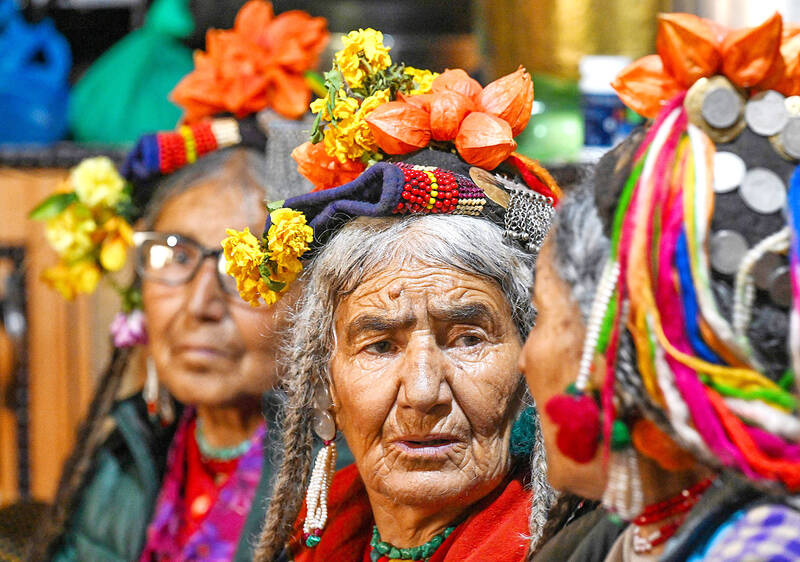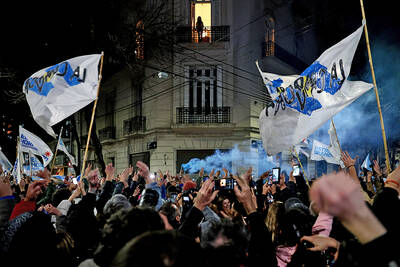High in the icy Indian Himalayas, a long-isolated people recall origin myths of millennia-old migrations from afar — an identity in disputed lands twisted today by politics.
The Brokpa people of Ladakh have no written language, practice a culture of polygamy and have their own calendar.
The most cherished ballad of the Brokpa, about 6,000 of whom live in a rugged mountain valley of the Indus River, is the “song of history.”

Photo: AFP
A new verse is added every 12 years, a cycle which counts as just one “year” in their calendar.
Tsering Gangphel, 85, said it details Brokpa legends that they came from ancient Rome.
Other Brokpa recount myths of ancestral links to Alexander the Great’s army, who invaded in the fourth century BC.
Scientists are skeptical, with one study of Brokpa DNA suggesting their roots lay in southern India, but Gangphel — who said he can sing a thousand songs in the Brokpa language detailing their culture — is adamant about his people’s past.
“We still celebrate our arrival here by dancing and singing in each village, once every three years,” Gangphel said at his home overlooking the roaring river. “We are Aryans.”
The deeply contested term refers to opaque prehistory — which critics say is today more about gritty realpolitik than foundation fables.
In South Asia’s ancient Sanskrit language, aryan means “noble” or “distinguished,” not a separate ethnicity.
It was once a loose term suggesting that people from Europe to Asia had linked ancestors in central Asia, reflected in common linguistic roots.
That is a far cry from the genocidal Nazi fantasies of a blond-haired and blue-eyed master race.
Some right-wing Hindus use the term to claim “Aryan” ancestors originated in India, linking it to a Hindu and national identity.
For the Brokpa, the term “Aryan” has been used as a tool to promote both tourism and India’s geopolitical ambitions.
Ladakh, part of Kashmir, is divided between India and Pakistan by a highly militarized frontier.
Each nation claims the region as their own.
Brokpa yak herder Tashi Namgyal in 1999 sighted “Pakistani intruders” in Indian-controlled territory and told Indian troops.
That triggered a 10-week conflict between the nuclear-armed rivals that cost 1,000 lives on both sides.
“I saved the nation’s honor,” 60-year-old Namgyal said, proudly showing army letters praising his service.
After the fighting stopped, Indian authorities pushed tourism in Brokpa areas, calling their lands the “Aryan Valley.”
The Indian Ministry of Tourism promotes them as the “Last Aryan Villages of India.”
Mona Bhan, a Brokpa expert at Syracuse University in New York, says the community uses “Aryan” to highlight its sociocultural practices and history, but Indian Hindu nationalists have used the term to “validate their hold on India’s disputed territory.”
The Brokpa calendar means a child’s first birthday is marked when they turn 12.
Using that calculation, a laughing and gray-haired Gangphel remarked that he is “just seven years old.”
Gangphel, a father of six who has two wives, said marrying outsiders was frowned upon.
“Being Brokpa means being unique in language, dress and dance,” 14-year-old schoolgirl Etzes Dolma said.
However, an influx of tourists and government development policies are bringing increasing modernity.
Earth and wood homes are being replaced with concrete and glass construction.
The Brokpa worship their traditional gods, but those now are often amalgamated into other beliefs.
Most Brokpas in India are Buddhists, while in Pakistan many have become Muslim.
Sangay Phunchok, 43, a lama, or Buddhist spiritual leader, said he shifted faith after hearing that “our ways will not grant us heaven.”
A monastery is being built in the village, but the Brokpa also honor their ancestral gods at a shrine of piled ibex horns.
“We still pray to our own gods, but goat sacrifice has stopped, because our lama said it’s a sin,” Gangphel said.

LANDMARK CASE: ‘Every night we were dragged to US soldiers and sexually abused. Every week we were forced to undergo venereal disease tests,’ a victim said More than 100 South Korean women who were forced to work as prostitutes for US soldiers stationed in the country have filed a landmark lawsuit accusing Washington of abuse, their lawyers said yesterday. Historians and activists say tens of thousands of South Korean women worked for state-sanctioned brothels from the 1950s to 1980s, serving US troops stationed in country to protect the South from North Korea. In 2022, South Korea’s top court ruled that the government had illegally “established, managed and operated” such brothels for the US military, ordering it to pay about 120 plaintiffs compensation. Last week, 117 victims

China on Monday announced its first ever sanctions against an individual Japanese lawmaker, targeting China-born Hei Seki for “spreading fallacies” on issues such as Taiwan, Hong Kong and disputed islands, prompting a protest from Tokyo. Beijing has an ongoing spat with Tokyo over islands in the East China Sea claimed by both countries, and considers foreign criticism on sensitive political topics to be acts of interference. Seki, a naturalised Japanese citizen, “spread false information, colluded with Japanese anti-China forces, and wantonly attacked and smeared China”, foreign ministry spokesman Lin Jian told reporters on Monday. “For his own selfish interests, (Seki)

Argentine President Javier Milei on Sunday vowed to “accelerate” his libertarian reforms after a crushing defeat in Buenos Aires provincial elections. The 54-year-old economist has slashed public spending, dismissed tens of thousands of public employees and led a major deregulation drive since taking office in December 2023. He acknowledged his party’s “clear defeat” by the center-left Peronist movement in the elections to the legislature of Buenos Aires province, the country’s economic powerhouse. A deflated-sounding Milei admitted to unspecified “mistakes” which he vowed to “correct,” but said he would not be swayed “one millimeter” from his reform agenda. “We will deepen and accelerate it,” he

Japan yesterday heralded the coming-of-age of Japanese Prince Hisahito with an elaborate ceremony at the Imperial Palace, where a succession crisis is brewing. The nephew of Japanese Emperor Naruhito, Hisahito received a black silk-and-lacquer crown at the ceremony, which marks the beginning of his royal adult life. “Thank you very much for bestowing the crown today at the coming-of-age ceremony,” Hisahito said. “I will fulfill my duties, being aware of my responsibilities as an adult member of the imperial family.” Although the emperor has a daughter — Princess Aiko — the 23-year-old has been sidelined by the royal family’s male-only